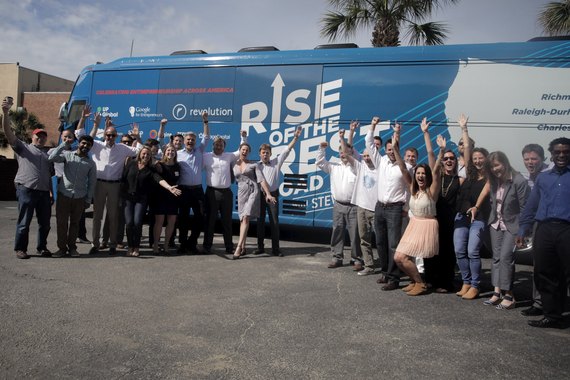"Do you think that Hemingway knew he was a writer at twenty years old? No, he did not. Or Fitzgerald, or Wolfe. This is a difficult concept to grasp. Hemingway didn't know he was Ernest Hemingway when he was a young man. Faulkner didn't know he was William Faulkner. But they had to take the first step. They had to call themselves writers. That is the first revolutionary act a writer has to make. It takes courage. But it's necessary."
-South Carolina's own Pat Conroy
Day 3 of the Rise of the Rest tour (and day 4 of reporting on it) took us to Charleston. As Steve Case said today, when planning the tour, Charleston was a bit of a dark horse. It's the smallest of the cities we've visited--with the youngest ecosystem--but with intriguing potential.
Today, Charleston delivered. Repeatedly, we have seen cities across the country with less-obvious entrepreneurial resources succeed build on their assets--rather than try and re-create what other people have.
We have seen this across the country. Louisville has a phenomenal emerging ecosystem around agriculture, led by Mayor Greg Fischer, who always says "we don't want to be Silicon Valley, but we do want to be the best place in the country for food and agriculture."
Albuquerque has a wonderful emerging ecosystem around water technology, spurred on by a confluence of one of the world's largest deposits of brackish water; best-in-class research labs at Los Alamos and Sandia; a perpetual struggle with drought; and a forward-thinking mayor, Richard Berry, who has organized the metro area around solving problems in water.
And today in Charleston, we saw a city that is building relentlessly upon its best aspects. People around the world know Charleston for great food, weather, and hospitality, and the business world knows it for its port and logistics expertise. Even the city's self-tagged startup nickname, "Silicon Harbor," outlines its key assets.
Although many people suggest that perhaps Charleston is too early along to be a great ecosystem, the community can create its own success--if it chooses. At a breakfast with civic leaders, Steve encouraged the Charleston community to create its own success, saying, "It's a civic duty to invest in startups in your community. Half of the Fortune 500 companies turn over every 25 years, and the startups you invest in now are the great businesses of the future. Investing in startups now is planting seeds for prosperity in the next generation."
Throughout the day, we saw what those seeds looked like--building on Charleston's greatest assets. Rewined, a fast-growing candle-making company that repurposes old wine bottles into beautiful home decorations, while creating 70 quality-paying jobs, many manufacturing, in a transitioning neighborhood of Charleston, draws on two great assets of the region--people like to drink wine bottles until they are empty, and like to create and buy beautiful things. BlokRok is a sun lotion applicator whose founder, Arianna Megaro, knows that beaches, golf courses, and bright days are something Charleston owns.
Another asset Charleston has is a community where people want to live. We toured Levelwing, a decade-old, very successful and profitable digital marketing firm whose founder, Steve Parker, moved the company from New York to Charleston because he said employee retention and happiness in Charleston was, comparatively, through the roof--people want to stay at Levelwing because they both loved the lifestyle and the professional opportunity.
Finally, we saw in the startups pitching for $100,000 investment from Steve Case a real assertion of the region's strengths. One company helps fishermen book guides and spots on demand--a $38 billion market that folks in South Carolina understand, I'm sure, much better than folks in Silicon Valley. Another startup was a gourmet burger distributor that was building on top of Charleston's reputation as the highest concentration of award-winning restaurants per capita. And the pitch happened on the USS Yorktown, on the Charleston Harbor--an un-matchable backdrop for entrepreneurs.
And the winner of the $100,000, Bidr, is more evidence of the observation we saw in Richmond with the spin-offs of CapitalOne--that successful enterprises have children and grandchildren. The software company Blackbaud, a startup 25 years ago that is now one of the region's largest employers, spawned two team members who launched Bidr as an innovative way that nonprofits can better fundraise through events. Seeing successful growing businesses help the entrepreneurs of the future is another way that startups pay it forward.
So while Charleston may be small, we saw reasons all day long to believe that it has the potential to be a great ecosystem. And on the Rise of the Rest Tour, we are looking for reasons to believe in the future, rather than to criticize the present. In response to business leaders saying "What can we do?" Stev said: "to promote entrepreneurship," Steve said, "suspend your disbelief a little bit. When talking to startups, don't think about why they'll fail; think about why they'll succeed."
We are now on the bus somewhere outside of Madison, Georgia, and while we had a wonderful day, we are now on to my hometown of Atlanta. While we'll be back to Charleston, entrepreneurial ecosystems take daily attention, and the future of Charleston entrepreneurs are in the hands of the wonderful leaders we met throughout a terrific day on the tour. I hope that the Charleston ecosystem, when thinking of the Rise of the Rest tour, takes the thoughts of native son Pat Conroy to heart: "Once you have traveled, the voyage never ends, but is played out over and over again in the quietest chambers. The mind can never break off from the journey."
Note: This post was cross-posted from Southern/alpha, which is the premier publication covering startups, entrepreneurship and innovation in the South with a focus on high-growth companies and the founders, engineers, investors, team and culture around them.
